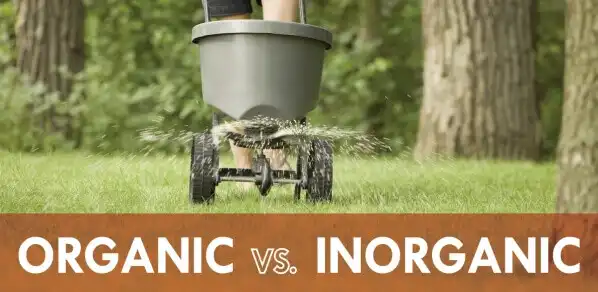Organic vs. Inorganic Fertilizers

A visit down the fertilizer aisle in your garden center can leave you scratching your head in confusion. With so many numbers to consider — different formulations, ratios, grades and application rates — you may decide you need a degree in math to figure things out. Then, as you consider the different nutrients listed on the package — elements like nitrogen, phosphorus, potassium and iron — you strain to remember even a cursory knowledge of high-school science classes. Finally, you'll have to decide whether to use an organic or inorganic fertilizer without fully knowing the difference between the two.
The Grounds Guys® can help you navigate the fertilizer maze. As a starting point, deciding which fertilizers to use on your plants depends simply on the nutrient needs of different plants and the availability of those nutrients in your soil. If you broadcast a randomly chosen fertilizer on your lawn, in your flower beds or vegetable garden, you may be wasting money on nutrients that your particular plants don't need; or even worse, you may do more harm than good by providing excessive fertilization that can burn — or even kill — your plants. And the misconception that organic fertilizers can't harm your plants can lead to disastrous results.
The Grounds Guys will test your soil to eliminate the guesswork of what to use and how much to apply, and we'll even adjust the soil's pH, if needed. If the pH is not in an optimal range, your plants cannot uptake the fertilizer they need — even if you supply it. Fertilizer is not a one-size-fits-all solution. Our landscape professionals know how your lawn needs different nutrients than your shrubs or trees, and how your flower beds need even different fertilizers. Based on our soil-test recommendations, your next decision is whether to use an organic or inorganic fertilizer to provide the needed nutrients.
So what's the difference between organic and inorganic fertilizers?
In a nutshell, look at the source of the fertilizer. If it's from a living source, such as a plant or animal, the fertilizer is organic. If it's manufactured, it's an inorganic fertilizer.
To help you make the decision of which type fertilizer to use, here's an overview of the advantages and disadvantages of each:
Advantages of Organic Fertilizer:
- Increase the soil's organic matter
- Improve the soil's structure
- Boost the soil's water-holding capacity
Disadvantages of Organic Fertilizer:
- Typically take longer to show results — slow acting
- Can be more expensive than inorganic fertilizers
Examples of of Organic Fertilizer:
- Cottonseed meal
- Bone meal
- Blood meal
- Fish emulsion
- Kelp meal
- Bat guano
Advantages of Inorganic Fertilizer:
- Typically fast-acting — lawns may "green up" quicker
- Lower cost
Disadvantages of Inorganic Fertilizer:
- Contribute to groundwater pollution because they often leach from the soil quickly
- Contain salts that can burn plants
Examples of Inorganic Fertilizer:
- Ammonium sulfate
- Ammonium phosphate
There may be some areas in your yard where your choice of an inorganic fertilizer is more suited to your goals and other areas where an organic source may be your preference. The Grounds Guys can help you determine the suitability of both types of fertilizer to meet your overall landscape goals. We can not only help you eliminate the guesswork of how much fertilizer to use in the different zones of your landscape, but we can also develop a fertilization calendar that tends to the needs of your plants year-round.
Whether your fertilizer goal is simply to create a lush, green, healthy lawn, or whether you desire a multi-faceted landscape with borders, beds and islands, The Grounds Guys can help. Starting with the preliminary work of soil testing to choosing suitable organic or inorganic fertilizers and then applying them properly, we'll make sure your yard receives the utmost of care.
 Click to call
Click to call


